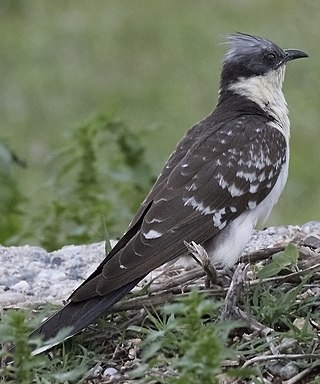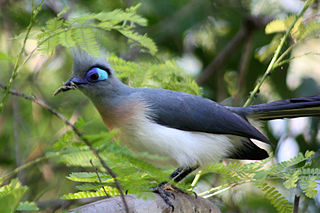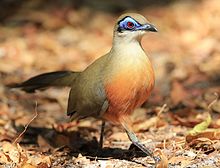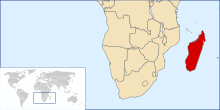
Cuckoos are birds in the Cuculidae family, the sole taxon in the order Cuculiformes. The cuckoo family includes the common or European cuckoo, roadrunners, koels, malkohas, couas, coucals, and anis. The coucals and anis are sometimes separated as distinct families, the Centropodidae and Crotophagidae, respectively. The cuckoo order Cuculiformes is one of three that make up the Otidimorphae, the other two being the turacos and the bustards. The family Cuculidae contains 150 species, which are divided into 33 genera.

The yellow-billed cuckoo is a member of the cuckoo family. Common folk names for this bird in the southern United States are rain crow and storm crow. These likely refer to the bird's habit of calling on hot days, often presaging rain or thunderstorms. The genus name is from the Ancient Greek kokkuzo, which means to call like a common cuckoo, and americanus means "of America".

The great spotted cuckoo is a member of the cuckoo order of birds, the Cuculiformes, which also includes the roadrunners, the anis and the coucals.

The Guinea turaco, also known as the green turaco or green lourie, is a species of turaco, a group of African otidimorph birds. It formerly included the Livingstone's, Schalow's, Knysna, black-billed and Fischer's turacos as subspecies.

The guira cuckoo, known in Spanish as the pirincho is a species of gregarious bird found widely in open and semi-open habitats of northeastern, eastern and southern Brazil, Uruguay, Paraguay, Bolivia, and northeastern Argentina. It is the only species placed in the genus Guira.

The mangrove cuckoo is a species of cuckoo that is native to the Neotropics.

Clamator is a genus of large brood-parasitic cuckoos with crests and graduated tails.

Cuculus is a genus of cuckoos which has representatives in most of the Old World, although the greatest diversity is in tropical southern and southeastern Asia.

The crested coua is a common medium-sized bird member of the cuckoo family, Cuculidae. It is endemic to Madagascar, mainly found in the coastal regions of the island. The crested coua is a weak flyer, so it will often be observed hopping from branch to branch in high canopies. It is distinguished mainly by its greenish-grey back, its prominent grey head crest, rufous-coloured breast, white abdomen and bright turquoise and blue patches of bare skin around the eyes.

The giant coua is a bird species from the coua genus in the cuckoo family that is endemic to the dry forests of western and southern Madagascar. It is suggested that couas probably originated from a particular Asian ground-cuckoo. The genus coua contains 10 species, more than any other genus in Madagascar. Although the bird is listed under least concern (LC) in the IUCN Red List of Threatened Species, it only persists in the biological hot spot of Madagascar, warranting its recognition as a species of conservation concern at the global scale.

Cacomantis is a genus of cuckoos in the family Cuculidae. The name is from the Ancient Greek κακομαντις (kakomantis) meaning "prophet of evil". Most species have a round nostril and are mainly in brown and gray colours. The tails are graduated and barred. The bars are transverse in sonneratii and oblique in all others.

The lesser coucal is a species of cuckoo in the family Cuculidae. It has a wide distribution range that overlaps with several other similar species. The habitat in which it is found is often marshy land with grass and tree cover. It is distinguished by its smaller size, less prominent bill, pale shaft streaks on the feathers of the head and back. It has a much longer claw on its hind toe and a distinct call. It is also among the few coucals that show season plumage differences but like in other coucals, the sexes cannot be distinguished in the field.

The Asian emerald cuckoo is a species of cuckoo in the family Cuculidae. It is found in Bangladesh, Bhutan, Cambodia, China, India, Indonesia, Laos, Malaysia, Myanmar, Nepal, Sri Lanka, Thailand, and Vietnam. Its natural habitats are subtropical or tropical moist lowland forests and subtropical or tropical moist montane forest.

The blue coua is a species of bird in the cuckoo family, Cuculidae. It is endemic to the island of Madagascar.

Coquerel's coua is a species of cuckoo in the family Cuculidae. It is endemic to Madagascar. Its habitat is subtropical or tropical dry forests. It was named in 1867 by the French naturalist Alfred Grandidier in honor of the French navy surgeon and naturalist Charles Coquerel.
The red-capped coua is a species of cuckoo in the family Cuculidae. It is endemic to northwest Madagascar.

The pallid cuckoo is a species of cuckoo in the family Cuculidae. It is the only species placed in the genus Heteroscenes. It is found in Australia, with some migration to the islands of Timor and Papua New Guinea. It is between 28 and 33 cm in size, with distinctive markings such as a dark bill, a dark eye with a gold eye-ring and olive grey feet which differentiate it from other cuckoos. The pallid cuckoo is similar in appearance to the oriental cuckoo, with barred immature pallid cuckoos being often mistaken for oriental cuckoos.

The chestnut-bellied cuckoo is a species of bird in the tribe Phaenicophaeini, subfamily Cuculinae of the cuckoo family Cuculidae. It is endemic to Jamaica.

The Jamaican lizard cuckoo is a species of bird in the tribe Phaenicophaeini, subfamily Cuculinae of the cuckoo family Cuculidae. It is endemic to Jamaica.
Coua berthae is an extinct species of coua, a large, mostly terrestrial bird in the cuckoo family, from Madagascar. It was the largest member of its genus, living or extinct. It was named in honour of the Malagasy zoologist Berthe Rakotosamimanana.





























